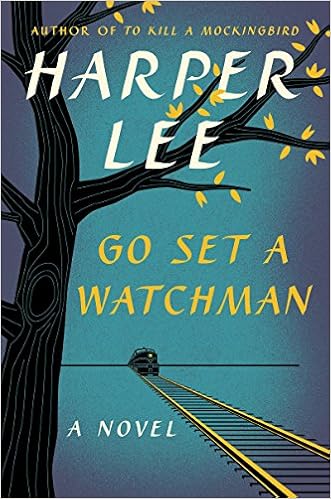Correction: I have been corrected by my father. Lee was in fact alive when Go Set a Watchman published. And, despite several strokes and general concerns about mental competency she did approve it for publication. I could pull this post down, but I'm leaving it up because the if anything the issue is thornier than I originally thought. It is possible, in a pre-digital age, that she genuinely thought the manuscript lost. It's also possible that she wasn't mentally competent to make the choice and that she was manipulated by those around her after her sister's death. Her sister, a lawyer by the way, shielded her from the press and managed her affairs for years. A lot of people look askance at the timing of it all, but it's one of those impossible things to know. Lee died soon after the publication. Did she think about what releasing the book would do to people's vision of Atticus? She was always pretty close-lipped with the media. So who knows. I don't. Although, I join the ranks of people who think something pretty dodgy went on there with the publication.
I have a real problem with people (publishers) digging around in an author's unpublished work posthumously. It's ghoulish. I can see the argument for publishing unfinished works that the author clearly meant to finish up. The intent is there. The argument for helping the author fulfill his/her intent is compelling in a way. So all you Robert Jordan fans, you can have your last "Wheel of Time" book guilt-free as far as I'm concerned.
What gets under my skin is those books that have sat in dust balls for years. Books that the author abandoned with little to no sign that they wanted to publish them. There's usually a reason for that and I think that authors should have a right to pass on without worrying that someone is going to paw through their files for unpublished tidbits.
It comes down to vision. Like most people in my generation, I had to read To Kill a Mockingbird. It was a part of the 10th grade curriculum and I liked it. I didn't read it the way Mrs. K wanted me to, one tedious chapter a day. I read it in one big gulp. Honestly, I wasn't really mature enough to fully understand all the themes, but I could see what the themes were and I liked Scout. Everybody likes Scout. I liked her whole family, actually.
Atticus, Scout's Father, is one of those honorable crusader types. He takes on the case of a young black guy accused, falsely, of rape. The book is set in Alabama in the 1930's. This case is a big deal. Much of the book has to do with this struggle between old ingrained social values at war with an even older sense of morality heading inevitably to change. Atticus is like an old school knight jousting with a dragon. I couldn't help but be impressed with him.
The story behind Go Set a Watchman is that it was written first. When Lee tried to get it published, the editor convinced her to expand on the sections dealing with the young Scout as opposed to the story of the adult version of her, Jean Louise. Lee did this, and the result was To Kill a Mockingbird. Go Set a Watchman was abandoned.
After Lee's death, someone went fishing through her records and revived the Go Set a Watchman. A large part of the English-speaking literate world snapped the book up when it came out in 2015. Imagine a brand new Harper Lee novel! Bibliophiles everywhere went into a literary feeding frenzy. Then came the backlash. Atticus the racist. People were appalled. How can the much beloved Atticus be racist? Travisty.
See, this is the problem with digging around in someone's unpublished work.
The Atticus of To Kill a Mockingbird and the Atticus of Go Set a Watchman are not really the same character. When Lee wrote To Kill a Mockingbird, she expanded on events referenced in Go Set a Watchman. Much of conflict in Go Set a Watchman is the friction between the two characters of Atticus. That's Jean Louise's/Scout's whole problem. How can a man who defended the undefendable because it was the right thing to do, be the same man who belongs to an essentially racist organisation in opposition to the NAACP?
That contradiction, is the point of the original manuscript. Or at least it should be. It was her first book. It has problems. Most of it is very readable. Then Scout confronts Atticus and it all goes sideways. The resulting argument is just a literary mess. If Harper Lee was one of my students I'd tell her she was too close to the material. It's clear that Lee felt very strongly about that argument. In fact, I don't think it was really Scout yelling at Atticus but rather Lee yelling at the rest of the South. As a result Atticus comes off as a racist when I think he was intended to be the personification of the fear that turns even intelligent moral individuals into unthinking members of the mob.
I think Lee meant us to feel pity for Atticus. However, after reading To Kill a Mockingbird no reader would ever feel pity for him. It's too much of a betrayal. I imagine Harper Lee knew that. It's probably why the book was abandoned.
This is why I don't think these things should be published. Sure a few literary scholars get some insight into Lee's writing process, but for the rest of the populace a much beloved character has been needlessly sullied. Whatever Lee intended with her revised version of Atticus is shadowed by early drafts. I don't think that's what Lee would have wanted.

Did you know that Atticus plays the Jew's harp?
ReplyDeleteDid you know that Atticus plays the Jew's harp?
ReplyDelete